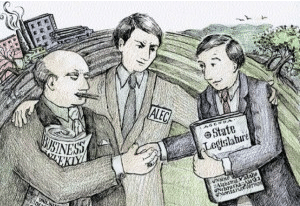Corporations are circumventing lobby laws by purchasing direct access to the nation’s lawmakers, according to a recent Bloomberg investigative report. Through membership fees paid to the American Legislative Exchange Council (ALEC), a Washington D.C. based policy institute, corporate entities like Exxon Mobil and Koch Industries are playing an active role in shaping state legislation.
According to Bloomberg, Koch and Exxon are among energy companies that stand to benefit from a cross-country energy policy that they helped write. Both companies paid a participation fee between $3,000 and $10,000 to sit at a legislative drafting table, among policy authors and elected officials.
ALEC charges membership fees of up to $35,000 and levies additional costs if companies want to join in policy creation sessions. The resulting draft “model legislation” is then adopted by member officials who support its passage into law.
The process amounts to a legal loophole, through which corporations can influence public procedure without registering the activity as lobbying.
According to Bob Edgar, president of Common Cause, “this is just another hidden way for corporations to buy their way into the legislative process.”
The alliance between lawmakers and some of the country’s most powerful corporate entities has elected representatives escorting industry issues through the political process. Companies like Exxon and Koch, who are generous campaign supporters, have direct access to legislators behind ALEC’s closed doors.
“It’s an end-run around transparency and disclosure laws,” says former Democratic representative Jeremy Kalin. As paying members of ALEC, corporations are in effect “paying for an opportunity to connect directly with legislators” he says.
According to Bloomberg, ALEC’s internal financial structure is a guarded mystery, as is its confidential list of corporate and legislative members. Because ALEC is a tax-exempt organization it is not required to disclose industry funds.
Bloomberg’s investigation uncovered internal documents that demonstrate a heavy reliance on corporate financing. Memberships for lawmakers are a meager $100 for two years, while companies can pay up to $100,000 for high-profile ‘sponsor’ positions and up to $35,000 for a seat at the drafting table. Companies can also sponsor events, like the one Exxon will pay $45,000 to host next month, to educate member politicians about unconventional gas.
“We try to provide our views on legislation to anyone who will listen, including legislators and non-governmental organizations,” says Alan Jeffers, Exxon spokesman.
There are currently more than 2000 state lawmaker and 300 private sector members of ALEC. There are 80 former ALEC members who currently represent their states in Congress.
Not surprisingly, the EPA’s proposed greenhouse gas reductions are emerging as a target for ALEC draft legislation, which is in part shaped by Exxon, Koch and other industry representatives. An ALEC report entitled “EPA’s Regulatory Train Wreck: Strategies for State Legislators” encourages state officials to pressure Congress to stop the EPA “by any means necessary.” So far 13 states have implemented ALEC-style legislation.
ALEC spokesperson Raegan Weber says the organization is committed to supporting “good conservative policy” which, according to the company website, means the promotion of free markets, limited government, federalism and individual freedom.
The reduction of GHGs in the atmosphere, if managed by a federal agency like the EPA, would for ALEC amount to a corruption of these principles. “Our position on EPA regulations is that they’re usurping the legislative process,” says Weber, which is remarkably similar to how others would describe the activities of ALEC.
Image Credit: ThinkProgress
Subscribe to our newsletter
Stay up to date with DeSmog news and alerts







